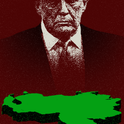The Supreme Court of the United States, Washington, DC. Photo: afagen
Last month, the Supreme Court spent three long days weighing the constitutionality of President Obama’s 2010 health care law. It’s the biggest case of the year, with real implications for the 2012 presidential election. For those who missed the brouhaha, the central question is whether Congress has the power to enact reforms that force all Americans to buy private health insurance. This could just be a new wrinkle in the legal compact that has allowed Social Security and Medicare to stand for decades. Or, as the law’s challengers would have it, it could be an alarming and “unprecedented” flexing of federal muscle. Also up for debate was how much of the 2,700 page law would fall if the court were to strike down the insurance mandate—all of it, or just a couple of interlocking pieces? In the wake of the Supreme Court arguments, a few observers have tried to spin legal dross into electoral gold. Conceding that a majority of the justices signaled grave to middling doubts about the constitutionality of the Act, optimistic democrats have nonetheless argued that it will actually be good for the president’s re-election chances if the court strikes down the law when they deliver their verdict in June. In that case, so the argument goes, Obama can energise his base by portraying the justices as a bunch of unelected robed radicals. “There’s nothing better to me than [the court] overturning this thing 5 to 4,” said James Carville, a Democrat strategist and adviser to former President Bill Clinton. “That is not spin.”
Maybe not, but it’s a fantasy. The central dilemma for any Democrat running for president is that the liberal base is not big enough to carry the election. This is partly the result of America’s electoral system, which allows a dozen or so swing states to determine the outcome. But the relatively small size of the liberal base is also a national phenomenon. In 2011, 21 per cent of Americans called themselves liberal, 35 per cent considered themselves moderate, and 40 per cent saw themselves as conservatives. Sure Obama needs to energise his base. But if that’s all he’s got, he’s toast.
And railing against the court for striking down the healthcare law isn’t likely to bring moderate independents out in droves for Obama, for a couple of reasons. The first is that healthcare reform isn’t that popular. Some of the legislation’s best-liked provisions, like access to health insurance for people with pre-existing medical conditions, don’t go into effect until 2014, so no one is reaping the benefits right now. Among independent voters, backing for healthcare reform hovers at only 50 per cent, a figure that includes the tepid supporters along with the hearty ones. Among respondents of all political persuasions—liberals too—only 16 per cent strongly back the healthcare law, according to recent polls. “The spirit of Franklin Roosevelt could be rekindled, with Mr Obama championing the will of the people against an overweening conservative judiciary,” wrote Edward Luce in the Financial Times at the start of April, joining Carville in the gallery of Obama optimists. But Franklin Roosevelt governed in the era of Great Depression, when many Americans were desperate and fewer viewed government power with overweening suspicion. Obama governs in the era of the Tea Party. How does judicial elimination of a law most Americans aren’t wild about spark a spirit bonfire?
The second reason a loss in court for the president won’t help him at the ballot box is that the justices’ standing with the public is higher than his. The Supreme Court has enduringly won higher approval ratings than the president or the Congress. Even in the wake of the Supreme Court’s decision in Bush v. Gore—the widely despised ruling which gave the 2000 presidential election to George Bush—trust and confidence in the court dipped only to quickly bounce back. Today, three-quarters of Americans believe that politics more than law will determine the outcome of the healthcare case. And yet according to one poll, more Americans rated the court’s performance as good or excellent after the March arguments than they did before. While the uptick was due to a change of heart among Republicans and independents, Democrats didn’t think less of the court—their views were merely unchanged. As New York University law professor Barry Friedman writes in his book The Will of the People, “The more salient Supreme Court decisions generally meet with great public approval. And even when they do not, the public supports the Court’s right to decide the cases nonetheless.”The standard explanation for the court’s popularity is its Olympian remove: We like it better than Congress and the president because the conventions of judging—discussion and drafting behind closed doors—mean we see little of it up close. The public probably wouldn’t hold the court in such high esteem if it could peer inside, not because the justices are up to no good, but because they’d be demystified.
As it is, we are a country that likes to believe in our courts. And so it’s highly unlikely that there will be a lasting backlash across the land against the justices for undoing the work of Congress and the president—never mind that they are our direct representatives. After the arguments that did not seem to go his way, President Obama tried to drive a wedge between the court and the public by calling the justices “unelected.” His remarks didn’t go over well. If he was testing the strategy of running against the court, the results should not encourage him. What should Obama do if the court brings down the healthcare law? Make it clear that he accepts the court’s authority while despairing of their constitutional arguments. And then try to salvage as much of his signature accomplishment as humanly possible.
Last month, the Supreme Court spent three long days weighing the constitutionality of President Obama’s 2010 health care law. It’s the biggest case of the year, with real implications for the 2012 presidential election. For those who missed the brouhaha, the central question is whether Congress has the power to enact reforms that force all Americans to buy private health insurance. This could just be a new wrinkle in the legal compact that has allowed Social Security and Medicare to stand for decades. Or, as the law’s challengers would have it, it could be an alarming and “unprecedented” flexing of federal muscle. Also up for debate was how much of the 2,700 page law would fall if the court were to strike down the insurance mandate—all of it, or just a couple of interlocking pieces? In the wake of the Supreme Court arguments, a few observers have tried to spin legal dross into electoral gold. Conceding that a majority of the justices signaled grave to middling doubts about the constitutionality of the Act, optimistic democrats have nonetheless argued that it will actually be good for the president’s re-election chances if the court strikes down the law when they deliver their verdict in June. In that case, so the argument goes, Obama can energise his base by portraying the justices as a bunch of unelected robed radicals. “There’s nothing better to me than [the court] overturning this thing 5 to 4,” said James Carville, a Democrat strategist and adviser to former President Bill Clinton. “That is not spin.”
Maybe not, but it’s a fantasy. The central dilemma for any Democrat running for president is that the liberal base is not big enough to carry the election. This is partly the result of America’s electoral system, which allows a dozen or so swing states to determine the outcome. But the relatively small size of the liberal base is also a national phenomenon. In 2011, 21 per cent of Americans called themselves liberal, 35 per cent considered themselves moderate, and 40 per cent saw themselves as conservatives. Sure Obama needs to energise his base. But if that’s all he’s got, he’s toast.
And railing against the court for striking down the healthcare law isn’t likely to bring moderate independents out in droves for Obama, for a couple of reasons. The first is that healthcare reform isn’t that popular. Some of the legislation’s best-liked provisions, like access to health insurance for people with pre-existing medical conditions, don’t go into effect until 2014, so no one is reaping the benefits right now. Among independent voters, backing for healthcare reform hovers at only 50 per cent, a figure that includes the tepid supporters along with the hearty ones. Among respondents of all political persuasions—liberals too—only 16 per cent strongly back the healthcare law, according to recent polls. “The spirit of Franklin Roosevelt could be rekindled, with Mr Obama championing the will of the people against an overweening conservative judiciary,” wrote Edward Luce in the Financial Times at the start of April, joining Carville in the gallery of Obama optimists. But Franklin Roosevelt governed in the era of Great Depression, when many Americans were desperate and fewer viewed government power with overweening suspicion. Obama governs in the era of the Tea Party. How does judicial elimination of a law most Americans aren’t wild about spark a spirit bonfire?
The second reason a loss in court for the president won’t help him at the ballot box is that the justices’ standing with the public is higher than his. The Supreme Court has enduringly won higher approval ratings than the president or the Congress. Even in the wake of the Supreme Court’s decision in Bush v. Gore—the widely despised ruling which gave the 2000 presidential election to George Bush—trust and confidence in the court dipped only to quickly bounce back. Today, three-quarters of Americans believe that politics more than law will determine the outcome of the healthcare case. And yet according to one poll, more Americans rated the court’s performance as good or excellent after the March arguments than they did before. While the uptick was due to a change of heart among Republicans and independents, Democrats didn’t think less of the court—their views were merely unchanged. As New York University law professor Barry Friedman writes in his book The Will of the People, “The more salient Supreme Court decisions generally meet with great public approval. And even when they do not, the public supports the Court’s right to decide the cases nonetheless.”The standard explanation for the court’s popularity is its Olympian remove: We like it better than Congress and the president because the conventions of judging—discussion and drafting behind closed doors—mean we see little of it up close. The public probably wouldn’t hold the court in such high esteem if it could peer inside, not because the justices are up to no good, but because they’d be demystified.
As it is, we are a country that likes to believe in our courts. And so it’s highly unlikely that there will be a lasting backlash across the land against the justices for undoing the work of Congress and the president—never mind that they are our direct representatives. After the arguments that did not seem to go his way, President Obama tried to drive a wedge between the court and the public by calling the justices “unelected.” His remarks didn’t go over well. If he was testing the strategy of running against the court, the results should not encourage him. What should Obama do if the court brings down the healthcare law? Make it clear that he accepts the court’s authority while despairing of their constitutional arguments. And then try to salvage as much of his signature accomplishment as humanly possible.












